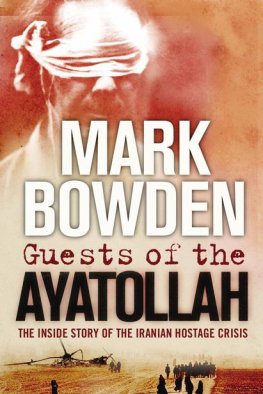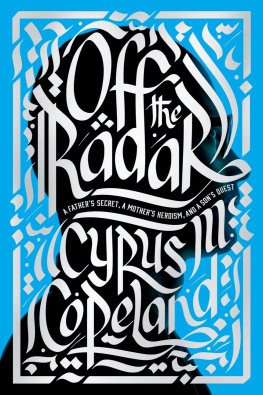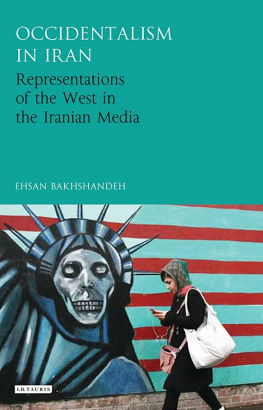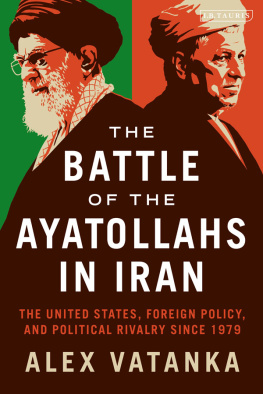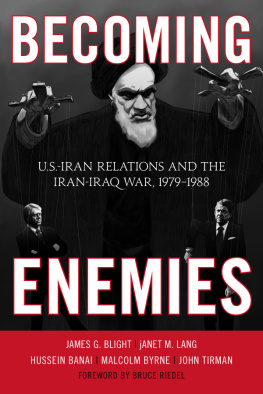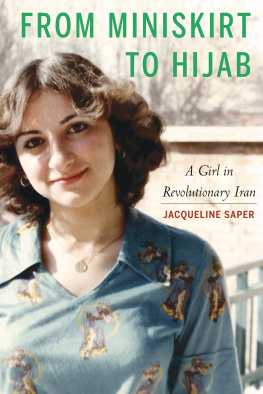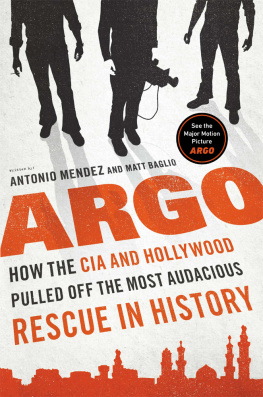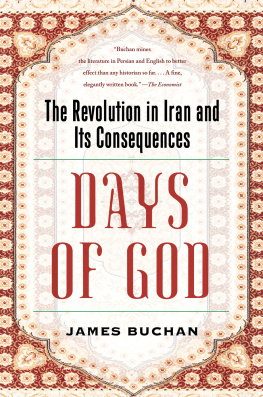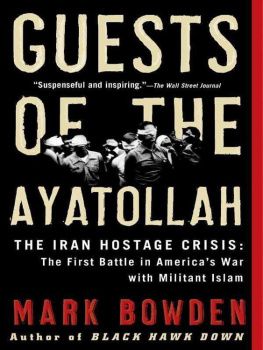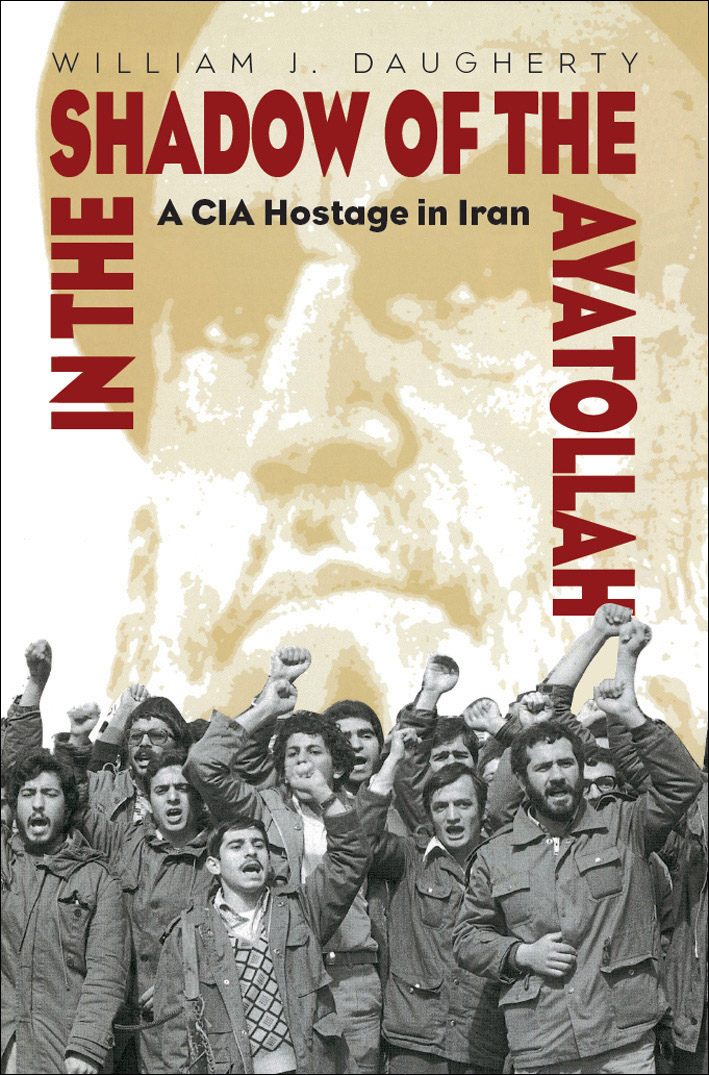

Naval Institute Press
291 Wood Road
Annapolis, MD 21402
2001 by William J. Daugherty
All rights reserved. No part of this book may be reproduced or utilized in any form or by any means, electronic or mechanical, including photocopying and recording, or by any information storage and retrieval system, without permission in writing from the publisher.
First Naval Institute Press paperback edition published in 2016.
ISBN: 978-1-61251-654-7 (eBook)
The Library of Congress has cataloged the hardcover edition as follows:
Daugherty, William J., 1947
In the Shadow of the Ayatollah: a CIA hostage in Iran / William J. Daugherty
p. cm
Includes bibliographical references and index
1. Iran Hostage Crisis, 19791981Personal narratives. 2. Daugherty, William J., 1947Captivity, 19791980. 3. HostagesIranBiography. 4. United States. Central Intelligence AgencyBiography.
E183.8.155 D37 2001
955.05'42'092dc21
2001030499

 Print editions meet the requirements of ANSI/NISO z39.48-1992 (Permanence of Paper).
Print editions meet the requirements of ANSI/NISO z39.48-1992 (Permanence of Paper).
24 23 22 21 20 19 18 17 16 9 8 7 6 5 4 3 2 1
First printing
The CIAs Publication Review Board has reviewed the manuscript for this book as required by Agency regulations, and poses no security objection to its publication. This review, however, should not be construed as an official release of information, confirmation of its accuracy, or endorsement of the authors views.
To the sacred memory of the eight courageous men who gave their lives in the Iranian desert so that others could be free; to the Honorable Kenneth Taylor, the members of the Canadian embassy in Tehran in 1980, and the government of Canada for daring to rescue six Americans in need; and to all Canadians for their enduring friendship with the United States and their support during the crisis of 197981
TABLE OF CONTENTS
Guide

CONTENTS



Bill Daugherty is one of my most intriguing friends. He has worn many hats during his lifetime, as a Marine Corps aviator, a member of the Central Intelligence Agency, a professor, an author, and, yes, even a hostage. When Bill and I cross paths, I am always reminded of the sacrifices he made for our nation while serving in the CIA, especially while being held hostage in Tehran by Iranian militants.
But my respect and admiration for Bill go beyond his public service. His efforts today as a teacher are just as profound. In todays society, in which education reform plays a large part of the national agenda, it is comforting to know that there are teachers like Bill who exceed expectations and make teaching their passion. When my interns tell me that Dr. Daugherty is one of their favorite professors and I see the smile that joins their remarks, I am also reminded of his dedication and ability to be a great educator.
Although I have never entered Bills classroom, I considered myself one of his students while reading a draft of this monumental achievement. His personal insight into the events that led to the hostage crisis and the politics involved in the decision making was truly enlightening. Indeed, the details of his nightmarish captivity are unbelievable. After finishing In the Shadow of the Ayatollah, I understood clearly why my interns consider Dr. Daugherty an accomplished teacher.
This book will leave you with a better understanding of the issues surrounding a dark period in American history. You will learn the truth about the American hostages experiences in Iran, especially while reading the bone-chilling accounts that begin in chapter 10. While Bill did not intend to emphasize the weaknesses of the Carter administration, he gives an honest account of the mistakes made by our leaders during that difficult time. Most important, you will gain firsthand knowledge from a selfless patriot who experienced the worst period of his life on behalf of the United States of America.
Congressman Jack Kingston


There are several points the reader should understand about this work. First, this volume tells mainly about one mans experiences during one significant period. I have included just enough information about the relationship between the United States and Iran in the years following World War II to set the stage. There is much more, but it lies beyond the scope of this work. Virtually everyone who was kind enough to review drafts of the manuscript suggested that I include such-and-such an event or discuss so-and-so, or that I contact this or that source for additional insights. They were all wonderful ideas, and truly I wish I could have accommodated. In the end, though, it was necessary to limit the text to the needs of the publisher. This volume, then, in no way constitutes a complete treatment of any element of Iranian or U.S.-Iranian history.
Likewise, this is not the definitive history of the hostage crisis. Many of the principals in the Carter administration have already recorded their memories of the event, and historians and political scientists have written much more. The interested reader should look to the Bibliography as a guide to these resources. Nor is this the representative story of the hostages themselves. In the 1950s there was a television program about the New York Police Department titled The Naked City. Each episode ended with the voice-over: There are eight million stories in the Naked City; this has been just one of them. Well, fifty-two Americans have individual stories of their 444 days as captives of the Iranians, and this is just one of them.
I had hoped to accomplish three objectives in this work. First, I wanted to present new material (within the limitations allowed) that would add to the understanding of what occurred in 1979, particularly with respect to the decision-making process in the White House. To this end I was aided immeasurably by individuals who participated in the events described in the text and generously shared what they learned and experienced firsthand. This book reflects the detailed information, unvarnished criticisms, and alternative points of view they passed along.
A second goal was to place certain events in more accurate perspective. Much of Americas Cold War foreign policy was informed and founded on intelligence data and activities that, due to security classifications or limited accessibility in open sources, are absent from earlier writings. As more of this material has been declassified, our knowledge of many events that occurred during that era has been expanded. Although this text does not rely on any documentary material that was not already in the public domain when earlier works about the hostage crisis were written, a significant amount of that data had been overlooked, given short shrift, or simply ignored by authors for any number of reasons. I have attempted to collate relevant items in this material to display key events in a truer light. That said, much more remains to be declassified, and historys judgments on some of the issues I have addressed may yet change.


